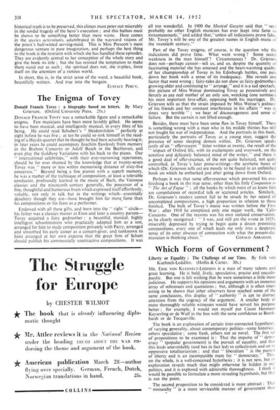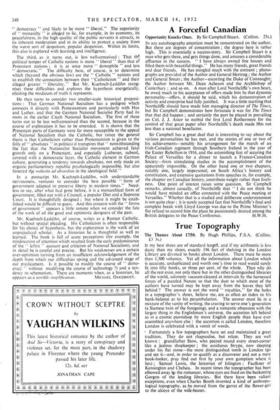Which Form of Government ?
Liberty or Equality : The Challenge of our Time. By Erik von Kuehnelt-Leddihn. (Hollis & Carter. 30s.)
MR. ERIK VON KUEHNELT-LEDDIEN is a man of many talents and great learning. He is bold, lively, speculative, precise and encyclo- paedic. But one is left wishing that he were sometimes a little more judicious. He supports his opinions and arguments with an immense array of references and quotations ; but, although it is often inter- esting to be shown that other observers have reached some of the same conclusions, this display of " authority " is apt to distract attention from the cogency of the argument. A smaller body of more thoroughly reliable witnesses would have served his purpose better ; for example, I would not myself put Count Hermann Keyserling or de Wulf in the box with the same confidence as Burck- hardt or de Tocqueville.
The book is an exploration of certain inter-connected hypotheses, of varying generality, about contemporary politics—some historical. others speculative ; some fresh, others not so novel. The first set of propositions to be examined is : That the impulse of " demo- cracy " (popular government) is the pursuit of equality, and that this leads unavoidably (and has in fact led) to collectivism and on to oppressive totalitarianism ; and that " liberalism " is the pursuit of liberty and is an incompatible mate for " democracy." This, on the whole, is a well-conceived hypothesis ; it is not new, but its exploration reveals much that might otherwise lie hidden in our politics, and it is explored with admirable thoroughness. I think it would be possible to formulate a more revealing hypothesis, but that is not the point.
The second proposition to be considered is more abstract : That " monarchy " is a more serviceable manner of goVernment than " democracy " and likely to be more " liberal." The superiority of monarchy " is alleged to lie, for example, in its economy, its peacefulness, in the high quality of the public servants it attracts, in its inherent moderation and in its ability to protect a society from the worst sort of despotism, popular despotism. Within its limits, this also is explored with learning and intelligence.
The third, as it turns out, is less well-conceived : That the political temper of Catholic nations is more " liberal " than that of Protestant nations ; it is at once more " demophile " and less " democratic." The difficulty here, of course, is to determine which (beyond the obvious few) are the " Catholic " nations and to establish the connection between their "Catholicism " and their alleged greater " liberality." But Mr. Kuehnelt-Leddihn recog- nises these difficulties and explores the hypothesis energetically, eliciting the modicum of truth it represents.
He then turns to consider two smaller-scale historical proposi- tions : That German National Socialism has a pedigree which connects it directly with Protestantism and particularly with Hus and Luther, and that the German National Socialist Party had its roots in the earlier Czech National Socialism. The first of these turns out to be less well-conceived than the second, because in the course of exploration it has to be emended. It is shown •that the Protestant parts of Germany were far more susceptible to the appeal of National Socialism than the Catholic, but (since the general thesis is that Catholicism rather than Protestantism is given to the folly of " absolutes " in politics) it transpires that " notwithstanding the fact that the Nationalist Socialist movement achieved fatal growth only on a Protestant, and especially Lutheran, subsoil, covered with a democratic layer, the Catholic element in German culture, generating a tendency towards absolutes, not only made an organic parliamentary republic psychologically impossible, but also fostered the reductio ad absurdum in the ideological field."
In a postscript Mr. Kuehnelt-Leddihn, with understandable nervousness, ventures to consider the best possible " form of government adapted to preserve liberty in modern times." Need- less to say, after what had gone before, it is a monarchical form of government, filled out with a Council, a popular Diet and a Supreme Court. It is thoughtfully designed ; but where it might be estab- lished would be difficult to guess. And this concern with the " forms of government " appears a little remote when we consider the fate of the work of all the good and optimistic designers of the past.
Mr. Kuehnelt-Leddihn, of course, writes as a Roman Catholic, but without special pleading. His Catholicism is often responsible for his choice of hypothesis, but the exploration is the work of an unprejudiced scholar. As a historian he is thoughtful as well as learned. The book is full of acute perceptions (for example, the misdirection of attention which resulted from the early predominance of the " leftist " account and criticism of National Socialism), and in detail he is careful and precise. But his weaknesses are a certain over-optimism (arising from an insufficient acknowledgement of the depth from which our difficulties spring and the advanced stage of our predicament. Is it possible to modify the course of " demo- cracy " without modifying the course of technology ?) and a ten- dency to schematism. There are moments when, as a historian, he appears as a terrible simplificateur. MICHAEL OAKESHOTT.











































 Previous page
Previous page